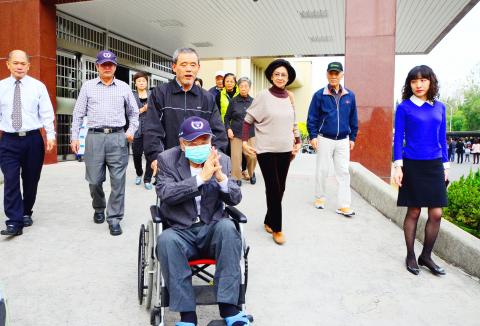Former Tainan mayor George Chang (張燦鍙) returned home on Friday, thanking his friends and supporters for not forgetting about him during the past two years he has spent in prison.
As he was released on medical parole from Tainan Prison, Chang, 80, was greeted by his family, well-wishers and former city government staff who had worked under him during his term as mayor from 1997 to 2001.
A member of the Democratic Progressive Party (DPP) when he won the mayoral election in 1997, Chang was in 2000 investigated on suspicion of corruption related to city infrastructure projects.

Photo: Wu Chun-feng, Taipei Times
Through subsequent appeals and retrials, the Supreme Court in its final ruling in March 2014 found Chang guilty on corruption charges and handed him a three-year prison term.
However, Chang has maintained his innocence. His family and supporters have long maintained the case was political persecution against a DPP elected official and a prominent figure in the overseas Taiwanese independence movement, and that he had been wrongly convicted on unreliable witness testimony and flimsy evidence.
Supporters said the justice system was against Chang and out to prosecute a prominent independence leader. Supporters said the courts had consistently ignored evidence presented by Chang in his favor, and that the judges had too much liberty and personal bias when giving the final verdict.
Chang was granted medical parole after repeated petitions. He has lower back problems and was transported in a wheelchair by family members.
“I want to thank my many friends for not giving up, providing their support and showing concern for me in the past two years,” Chang said. “Right now I need to rest and recuperate. There are words I would like to say and will arrange for an official occasion in the future to release my statements.”
A graduate of National Taiwan University, Chang obtained his doctorate and taught chemical engineering at US universities in the 1960s and 1970s.
He is best known as an early leader of the Taiwanese independence movement in the US and for lobbying the US government to support Taiwan’s freedom and democracy during the Martial Law era.
Along with fellow members of the Taiwanese “exile community” in the US, Chang helped to establish several activist organizations, culminating in the founding of the World United Formosans for Independence (台灣獨立建國聯盟) in 1970, for which he served as vice chairman from 1970 to 1973, and was elected chairman from 1974 to 1987.
In the aftermath of a violent crackdown on a demonstration in then-Kaohsiung City on Dec. 10, 1979, to demand an end to Chinese Nationalist Party (KMT) one-party rule and the lifting of martial law, known as the Formosa Incident (美麗島事件), Chang led fellow Taiwanese communities in the US to support the suspects arrested by the KMT and lobbied the US government to support democracy and human rights in Taiwan.
Chang returned to Taiwan in 1991, but was arrested and charged by the KMT government on sedition charges for offenses against the internal security of the state. However, it had led to an international outcry and the law was amended. Chang was found not guilty and released in October 1992.

The manufacture of the remaining 28 M1A2T Abrams tanks Taiwan purchased from the US has recently been completed, and they are expected to be delivered within the next one to two months, a source said yesterday. The Ministry of National Defense is arranging cargo ships to transport the tanks to Taiwan as soon as possible, said the source, who is familiar with the matter. The estimated arrival time ranges from late this month to early next month, the source said. The 28 Abrams tanks make up the third and final batch of a total of 108 tanks, valued at about NT$40.5 billion

Two Taiwanese prosecutors were questioned by Chinese security personnel at their hotel during a trip to China’s Henan Province this month, the Mainland Affairs Council (MAC) said yesterday. The officers had personal information on the prosecutors, including “when they were assigned to their posts, their work locations and job titles,” MAC Deputy Minister and spokesman Liang Wen-chieh (梁文傑) said. On top of asking about their agencies and positions, the officers also questioned the prosecutors about the Cross-Strait Joint Crime-Fighting and Judicial Mutual Assistance Agreement, a pact that serves as the framework for Taiwan-China cooperation on combating crime and providing judicial assistance, Liang

A group from the Taiwanese Designers in Australia association yesterday represented Taiwan at the Midsumma Pride March in Melbourne. The march, held in the St. Kilda suburb, is the city’s largest LGBTQIA+ parade and the flagship event of the annual Midsumma Festival. It attracted more than 45,000 spectators who supported the 400 groups and 10,000 marchers that participated this year, the association said. Taiwanese Designers said they organized a team to march for Taiwan this year, joining politicians, government agencies, professionals and community organizations in showing support for LGBTQIA+ people and diverse communities. As the first country in Asia to legalize same-sex

MOTIVES QUESTIONED The PLA considers Xi’s policies toward Taiwan to be driven by personal considerations rather than military assessment, the Epoch Times reports Chinese President Xi Jinping’s (習近平) latest purge of the Chinese People’s Liberation Army (PLA) leadership might have been prompted by the military’s opposition to plans of invading Taiwan, the Epoch Times said. The Chinese military opposes waging war against Taiwan by a large consensus, putting it at odds with Xi’s vision, the Falun Gong-affiliated daily said in a report on Thursday, citing anonymous sources with insight into the PLA’s inner workings. The opposition is not the opinion of a few generals, but a widely shared view among the PLA cadre, the Epoch Times cited them as saying. “Chinese forces know full well that